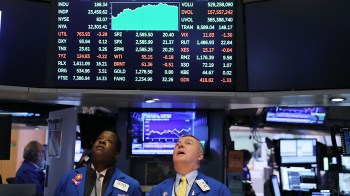The economy and elections: Ghosts of the past
Share Now on:
The economy and elections: Ghosts of the past
Kai Ryssdal:We’re still down in the low percentages of precincts reporting in Michigan tonight, but this much we know. It’s gonna be closer than anybody thought even a couple of days ago. And somehow it’s fitting that the state hit hardest by the economy of the past four years is getting its turn in the political spotlight. It’s a long ways yet ’til Election Day in November, so on this primary night and as we gear up for Super Tuesday just a week from now, forget about the pure politics for a minute.
In the first of a three-part series, Marketplace’s Mitchell Hartman does some election economics.
Mitchell Hartman: It’s the election of 1992 . And after 12 years of Presidents Reagan and Bush, it’s no longer “Morning in America” — more like a grey, rainy afternoon. Unemployment has hit 8 percent; it had been 5 percent four years earlier. At Bill Clinton’s campaign office in Little Rock, Ark., adviser James Carville has tacked a note on the wall. It reads: “The Economy, stupid.”
And hitting people’s fears about unemployment and economic malaise has worked ever since, says Washington political analyst Stan Collender.
Stan Collender: Once the U.S. economy started to be a little bit more questionable, economic growth wasn’t guaranteed every year, the economy started to be the big issue. You go back to the Clinton years — everything else in American politics these days takes a back seat.
Clinton’s success in the campaign came from turning the electorate’s worries about high unemployment and a struggling economy, into an issue of growing income disparity, as he did in this TV spot.
Bill Clinton: The middle class is collapsing, poverty is exploding, only the rich are doing better, because for 12 years we’ve been dominated by selfishness and greed and a concern for the short run.
Sounds like a page out of campaign 2012.
*******
Hartman: Princeton historian Julian Zelizer says, if you want to see the textbook case of Americans’ economic fear and despair determining an election, just look at 1932. Franklin Roosevelt versus Herbert Hoover. Zelizer says Roosevelt still didn’t have the New Deal worked out yet. But with one in four Americans out of work, consumers with nothing to spend, anyone seemed better than Hoover.
Julian Zelizer: It doesn’t always really matter what your answers are, so much as your ability to blame the incumbent and connect the economic problems to that president.
Two years ago, the midterm elections were a slam-dunk for Republicans, with consumer confidence and housing and employment all in the tank. But, says political analyst Stan Collender:
Collender: One of the things we’ve noted over the years is that it’s the trend, rather than the absolute numbers, that become important. And it looks as if Obama has some of that going for him right now. Unemployment is falling, in fact, falling rather dramatically. Consumers seem to be spending more.
Still, as much as some of the trends are encouragingly positive for the president —
Collender: It’s not just what the economy is today, it’s your perceived ability to manage it going forward.
And Republicans can take some tips here from Roosevelt v. Hoover. After all, President Obama’s already had four years to manage the economy back to health.
*******
Hartman: It was the election of 1980 and virtually nothing was going well in the economy for the incumbent, Jimmy Carter, says political analyst Stan Collender.
Collender: Gasoline prices and gasoline shortages: both of those were affecting, in ways that look quaint by today’s standards.
Which gave Republican candidate Ronald Reagan the opening to ask this of Americans:
Ronald Reagan: Are you better off than you were four years ago? Is it easier for you to go and buy things in the store than it was four years ago?
Gas prices and inflation were Carter’s Achilles Heel—slowing economic growth and driving unemployment higher. Reagan’s landslide was partly the result. Nowadays, gas prices are going up, but inflation over all is subdued.
Still, Princeton historian Julian Zelizer says the Republican challenger in this year’s election could play off Americans’ fear of higher prices to come. After all, they’ve done it before: in the 1950s and 1960s.
Zelizer: Republicans tapped into the same issue to attack Democrats in a period when the economy was doing well.
And back in the 1960s, with unemployment as low as 3.5 percent, the economy wasn’t struggling like it is today.
I’m Mitchell Hartman for Marketplace.
There’s a lot happening in the world. Through it all, Marketplace is here for you.
You rely on Marketplace to break down the world’s events and tell you how it affects you in a fact-based, approachable way. We rely on your financial support to keep making that possible.
Your donation today powers the independent journalism that you rely on. For just $5/month, you can help sustain Marketplace so we can keep reporting on the things that matter to you.


















